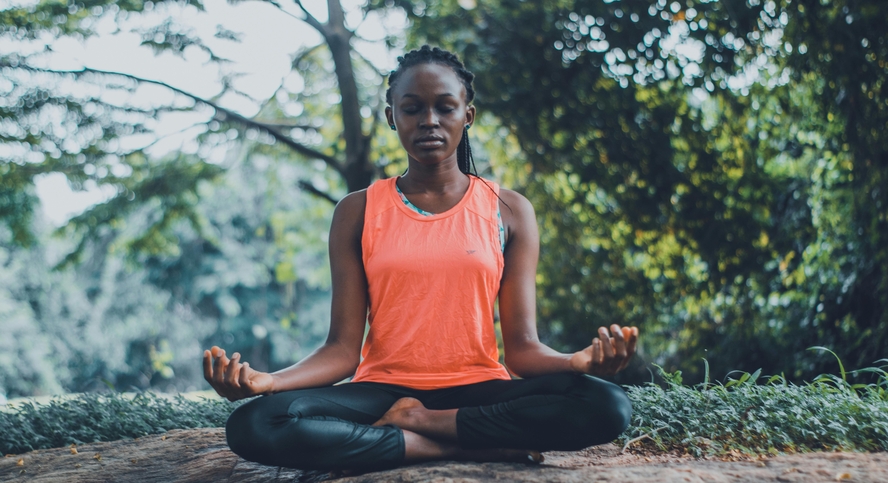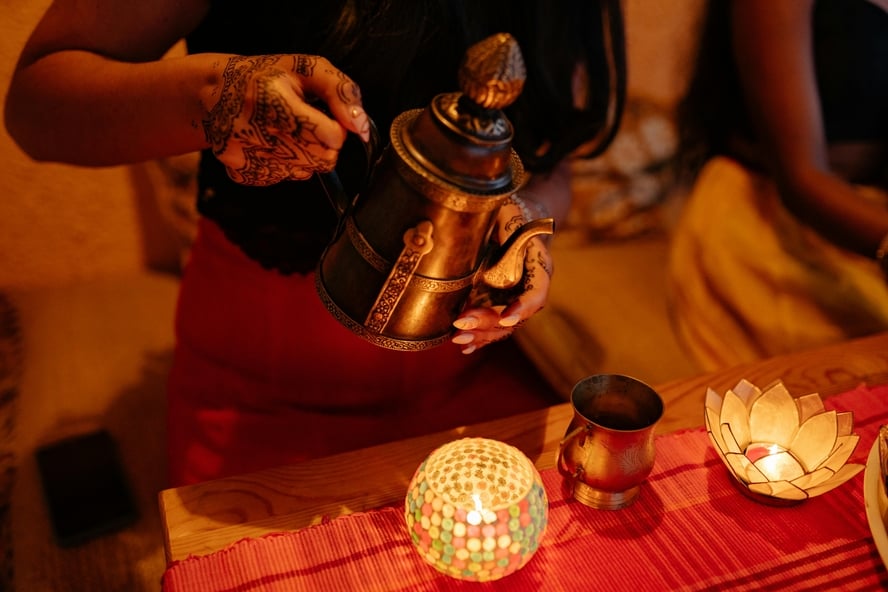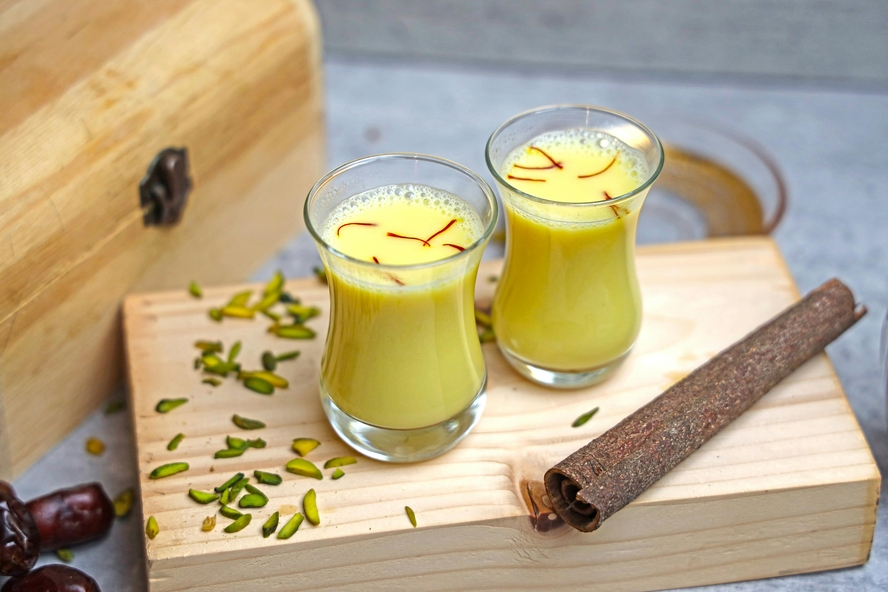How Understanding Vata Dosha Changed My Life [An Ayurvedic Expert’s Story]
A vata dosha imbalance may be causing bloating, shortness of breath, and trouble sleeping. Here’s how Ayurveda can help you find healing.

If I said to you, “It’s almost Libra season,” you’d probably know exactly what I was talking about. But if I said “It’s almost vata dosha season,” would you know what I meant?
Vata season refers to the time of year that the Ayurvedic energy pattern vata dosha is cresting. According to Ayurveda, each season is associated with a dosha, or a pair of essential elements. Vata season occurs in the late fall and early winter (the cooler and dry parts of September through February) — during this time, being conscious of any disorder in our bodies and minds due to an increased vata can help us stay balanced.
Never heard of Ayurveda or not sure what I’m talking about? Let’s break things down.
What Is Ayurveda?
Ayurveda is the oldest healing system in the world. It’s a 5,000-year-old traditional medicine system native to India. The term Ayurveda is derived from the Sanskrit words ayu (life) and veda (science or knowledge), and Ayurveda also translates to knowledge of life.

Want more wellness perspectives from experts in their fields? Sign up for the newsletter for more non-toxic living guidance and wellness advice.
Understanding Doshas in Ayurveda
According to Ayurveda, there are three energy patterns known as “doshas” that exist in every biological organism. Dosha is a Sanskrit word that literally means “stain” or “lesion,” but it essentially conveys the idea of something that can be injured or imbalanced. The three doshas are vata, pitta, and kapha.
All three Ayurvedic doshas are present in every cell and every tissue of every organism, just in varied proportions. Each dosha has a number of corresponding qualities. They govern all of the body’s processes, from our bodily functions to our thoughts and feelings.
What Are the Three Ayurvedic Doshas?
Ayurveda tells us that everything in the universe (including ourselves!) is made up of the five essential elements. These five elements are Ether/Space, Air, Fire, Water, and Earth. When combined, pairs of these elements form the three Ayurvedic doshas.
- Vata: Ether (space) and Air
- Pitta: Fire and Water
- Kapha: Water and Earth
Though everyone has some of each dosha, most people tend to have an abundance of one or two of the doshas.
Why Do the Ayurvedic Doshas Matter?
Just as everyone has a unique fingerprint, each person has a particular pattern of energy — an individual combination of physical, mental, and emotional characteristics — which comprises their own constitution. This unique constitution is determined at the moment of conception and is your own personal blueprint, or prakriti (nature).
When in balance, vata, pitta, and kapha govern the body functions. But when imbalanced, they can cause health issues and diseases. The key aspect of Ayurvedic healing is to identify which dosha is out of harmony and restore health by bringing it to its original prakriti (balanced state).

As you move through life, the proportion of the three doshas constantly fluctuates based on your environment and geographic location, your diet, your age, stress levels, and even the time of day. As they move in and out of balance, the doshas can affect your emotional, physical, and mental wellbeing. Any state of dosha imbalance is called vikruti.
Doshas and Seasons
As mentioned, doshas also crest during different seasons. In Ayurveda, late winter to spring is known as kapha season, summer is pitta season, and autumn and the early parts of winter are vata season. Vata season is around the corner, so let’s take a look at how to keep the vata dosha balanced.
The Power of Vata Dosha
What is vata dosha, and how does it affect our bodies and minds? According to Ayurveda, the nervous system is governed by the vata dosha. When our vata is in balance, our breath supports our nervous system. Our body movements are graceful and unhindered, yet controlled. There is homeostasis between tissues and organs.
The Effects of an Imbalanced Vata

When vata dosha is out of balance, the result is fear and anxiety. Movements become erratic, excessive, decreased, or are blocked. Fun fact: vata not only regulates the nervous system but also our creativity, so a vata imbalance might negatively affect our ability to create. Other symptoms of an imbalanced vata dosha may include:
- Hoarse voice
- Mind chatter
- Burping
- Cold hands and feet
- Feeling unanchored
- Restlessness
- Hiccups
- Gas
- Bloating (take a peek at some tips for addressing bloating with Ayurveda)
- Stiffness in muscles and joints
- Shortness of breath
- Cracking joints
- Inability to focus
- Trouble sleeping
- Dry cough
- Constipation
- Twitching
How Ayurveda Transformed My Life
In the summer of 2023, both my father and father-in-law passed away within two days of each other. In the aftermath, people were shocked by my “stability” and productivity despite the grief I was experiencing.
Shortly after, I completed my Doctorate in Ayurveda, finished a business course, and wrote a new book THE LOSS THAT BINDS US (a grief manual with 108 tips to help grievers and their support systems as they navigate difficult times). When people asked how I had managed to show up daily, I’d say, “It’s because of the Ayurvedic diet and lifestyle.”
I firmly believe in the power of Ayurveda to help find balance in all aspects of your life, and I hope sharing these tips can offer you a potential tool if you ever find yourself in need of healing.
Simple Tips to Keep Your Vata Dosha Balanced During Vata Season and Beyond

- Stick to a regular routine. Wake up and go to bed at a fixed time.
- Don’t skip meals, and eat on a consistent schedule. Ayurveda recommends eating three balanced meals to pacify vata. A healthy diet based on Ayurveda could make all the difference.
- Eat warm, cooked foods, which means avoiding raw salads or cold foods whenever possible.
- Excessive exercise can exacerbate vata, so don’t push it during this season and opt for gentler workouts.
- Meditation is instrumental in pacifying vata because it calls for a withdrawal of the senses (or a removal of external distractions — think less screen time and more stillness).
- Vata Season tends to be dry, so remember to hydrate your system with water and warm, herbal teas.
- Self-massage or abhyanga with warm oil (I recommend sesame oil!) is great for nourishing and hydrating the body. Warm baths can have a similar effect — try making these Ayurvedic bath salts or this Ayurveda facial mask for a special treat.
- Don’t overwhelm yourself by adding too much to your plate during this time! Your vata will already be in overdrive, so no need to overdo it.
- Listen to your body; it holds infinite wisdom.
“Ayurveda is the science of life that teaches us how to live in harmony with nature and the world around us.”
Dr Robert Svoboda
Disclaimer: The content is purely informative and educational in nature and should not be construed as medical advice. The information is not intended for use in the diagnosis, treatment, cure, or prevention of any disease. Please use the content only in consultation with an appropriate certified medical or healthcare professional. If you are looking for advice from a trained Ayurvedic Doctor, contact me.
Read More on Organic Authority


